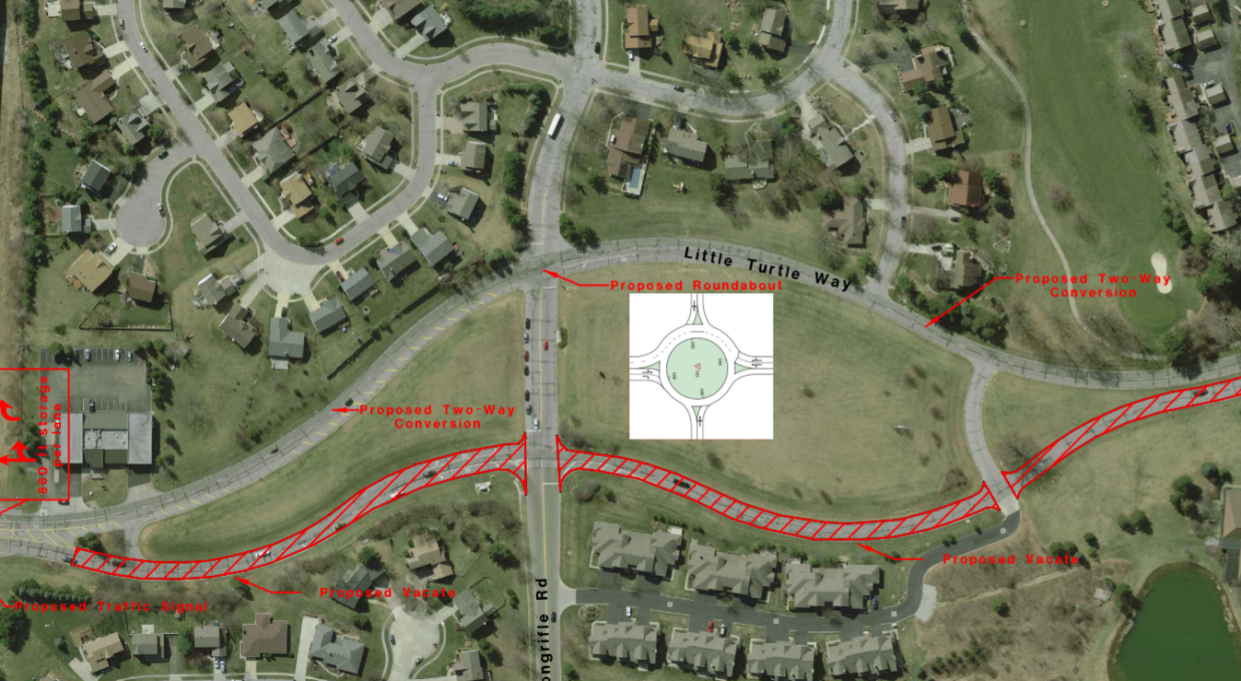Columbus' Little Turtle plan originated with director's husband, records show

A newly revealed document shows that the city of Columbus' plan to redesign the entrance to the Little Turtle subdivision on the Northeast Side originated in a proposal from the husband of the city's public service director, whose office ultimately carried out the project at taxpayer expense.
Other documents show that the city's Department of Development, under lobbying from developer Mo Dioun, had initially reviewed and apparently rejected a proposal to create a city "tax increment finance" fund to pay for the $6 million project with increased property taxes from Dioun's planned private improvements.
But when that funding idea went nowhere, the city's Department of Public Service pushed forward without TIF funding, paying for the reconstruction project out of city bond funds after Dioun hired former Mayor Michael B. Coleman to be his lobbyist specifically to secure the reconstruction project.
More on Little Turtle plan: Franklin County court halts Columbus' Little Turtle road project for second time
Dangerous golf cart crossing
Documents indicate that one of Dioun's original concerns was that golf carts from the golf course he purchased in June 2015 were having a tough time safely crossing Little Turtle Way because of the speed of passing traffic.
"Little Turtle Way is proposed to be reduced to one lane in each direction, and the alignment is proposed to be revised," John Gallagher, then the director of Traffic & Planning Services for Carpenter Marty Transportation Inc., wrote the city Public Service Department in December 2016. "...A roundabout is the preferred method of traffic control for this intersection. Aesthetically, a roundabout would fit in well with the community and the desired look and feel for the area."
John Gallagher is the husband of city Public Service Director Jennifer Gallagher.
The Dispatch reported in February that the Ohio Ethics Commission would review conflict of interest allegations against Jennifer Gallagher over a $480,000 engineering contract that her department subsequently awarded to Carpenter Marty in 2018 to help redesign Little Turtle Way in a manner that closely followed the proposal laid out initially by John Gallagher on behalf of his firm's client, Dioun.
John Gallagher's signed, 38-page proposal advocating for the project to his wife's department included two schematic drawings of the proposed new roundabout.
He didn't return a call to his office.
City: Safety, congestion behind project
"As the leader of the city’s Department of Public Service, Director Gallagher has an interest in, and it is her job, to know about every infrastructure project the department has a role in," the department said in a written statement issued Monday. "When she assumed leadership in 2016, Director Gallagher sought an advisory opinion from the Ohio Ethics Commission on contract awarding, and she has abided by it.
"Department engineers serve as project managers to manage all phases of our projects, and that has been no different with the Little Turtle Way roadway improvement project," the statement said. "The rebuilding of this deteriorating roadway will add new public infrastructure that eases congestion, reduces speed and supports safe multimodal transportation for everyone who lives, works and travels in this high-growth area."
More on Little Turtle paln: Columbus forwards Little Turtle conflict of interest complaint to Ohio Ethics Commission
The Dispatch asked the department if it could provide any documents showing Jennifer Gallagher had recused herself from decision-making over any Little Turtle work that her husband may have had an interest in, but none was provided. The office previously noted that Jennifer Gallagher didn't sign the contract awarding her husband's firm the city design contract — rather, she authorized a subordinate, Assistant Director Steve Wentzel, to sign her name for her.
In February, The Dispatch asked public service officials how many contracts Wentzel signed on Jennifer Gallagher's behalf between April 5, 2016, and Feb. 11, 2022. In an emailed response, Randy Borntrager, assistant public service director, said: “It is hundreds/nearly all – meaning the only time he doesn’t sign them is when he is on vacation.”
Magistrate allows construction to resume
Construction of the new road was stopped by a judge last month for the second time since last summer after a group of Little Turtle residents opposed to the project filed their second lawsuit. It expanded upon initial claims of city open meetings violations to include that the city illegally vacated a public roadway to Dioun, entered a non-written agreement to swap land with Dioun that wasn't approved by the City Council, and that the project is costing taxpayers significantly more than the $781,000 that a consultant said in 2017 was minimally required.
On Tuesday, Franklin County Common Pleas Magistrate Pamela Broer Browning denied the residents a preliminary injunction further delaying construction, agreeing with the city that Little Turtle Way is a "failed and unsafe public road," and that they had failed to prove they would be harmed by improvements to it.
More: Some Little Turtle residents line up behind city roadway redesign
Residents were not opposed to improvements, but the city "never explored a lesser-expensive alternative," said Phil Harmon, an attorney representing the residents who himself lives in the subdivision. "They never put it out for bid. They never seriously analyzed whether there's a better way to do this."
An observer to the first suit, former city council candidate Joe Motil, filed an ethics complaint with the city after learning that John Gallagher's firm had been awarded a contract on the project from Jennifer Gallagher's department, demanding an investigation. The city in turn referred the complaint to the Ohio Ethics Commission, which is prohibited from commenting on its status.
The Dispatch reported in February that weeks after being appointed director in the spring of 2016 Jennifer Gallagher wrote the Ethics Commission concerned about the legality of her signing contracts with Carpenter Marty because of her husband's employment with the firm.
The Ohio Revised Code states that no public official can "authorize, or employ the authority or influence" of the office to award any contract in which a family member had an interest. Violating that provision is a felony.

"Therefore, you cannot participate in any way, formally or informally, in the authorization of a public contract for which your husband has an interest," the commission informed her, noting that she should recuse herself from participating in the authorization of any Carpenter Marty project if her husband had an ownership interest in the firm, or if he participated in the contract's negotiations, prepared bids or proposals, oversaw work, administered the contract, or met certain other conditions.
Records from the first lawsuit show that in July 2016, a few months after receiving the Ethics Commission's advisory letter, Jennifer Gallagher met with Dioun — who by this time had been a client of husband's firm for over a year — to discuss options for improving Little Turtle Way.
"Mr. Dioun is the owner of the Little Turtle Golf Course and was concerned about golf cart crossings along the roadways," according to a Carpenter Marty summary of work completed for Dioun included in court documents. Dioun had first approached the firm in May 2015 seeking a proposal to send the city, and "by October of 2017 it was clear to CM a design project was pending for improvements along Little Turtle to be developed by the city."
The TIF vanishes
Dioun initially also was lobbying the city Development Department for a city TIF to fund the construction, documents show.
"We need to reach some conclusions regarding a TIF for Little Turtle," former city Development Director Steve Schoeny texted a member of his staff in April 2016. "Mo has been very patient with us, and I have been abusing that patience.
"I think that Mo makes a reasonable case for city participation in the project. It is a redevelopment, of sorts, to correct some poorly designed infrastructure. It isn’t very often that we have the opportunity to use TIF funds to support an existing, middle income neighborhood."
Schoeny instructed his staff to find if there was a "precedent for this situation," and also whether Public Service knew about Dioun's proposal.
In May 2016 Schoeny texted an official in Mayor Andrew J. Ginther's office that: "We did recently tell Mo that we could support a TIF for him to reconfigure the entrance to Little Turtle, if he did a traffic study and some community outreach that resulted in a positive response reaction from current residents in Little Turtle."
In a recent interview, Schoeny, now city manager of Upper Arlington, said he had no recollection of the matter besides what's in his texts. Dioun never received a TIF.
More: Documents point to developer, not Columbus, as creator of controversial Little Turtle plan
Residents behind the lawsuit believe that the city is relocating the roadway to maximize Dioun's developable land at the site. They claim the city has deliberately hidden the project's connections to Dioun's lobbying, which included large campaign donations to various city officials, while pushing a narrative that the work is needed to advance motorist safety.
The city submitted its findings of fact in the case after a two-day hearing in early April. In it, city lawyers say that Little Turtle Way improvements will fix the safety issued created by the current design flaws. They also say that residents don’t have standing in the case because City Council has not voted to vacate the northbound lanes. They say that the money for the work has not been misused.
And they also say that there is no clear evidence that an oral contract exists between the city and Dioun's firm, Firewater, where Firewater would donate property to the city contingent upon Columbus vacating a portion of the northbound lanes.
“Legislative discretion includes the decision to vacate a road and to set forth traffic control policy, even when those decisions promote private development,” the city said in a court filing.
Catherine Turcer, executive director of government watchdog group Common Cause Ohio, said if fixing an unsafe road was really the main motivation behind the project, "you wouldn't need Michael Coleman as a lobbyist."
wbush@gannett.com
@ReporterBush
mferench@dispatch.com
@MarkFerenchik
Get more political analysis by listening to the Ohio Politics Explained podcast
This article originally appeared on The Columbus Dispatch: Little Turtle road plan to city iniitally came from director's husband

